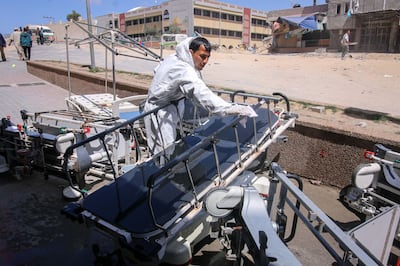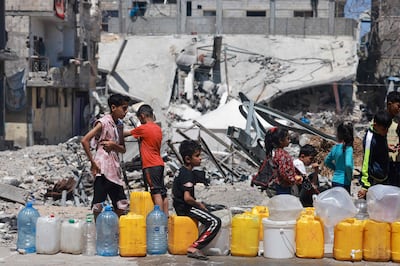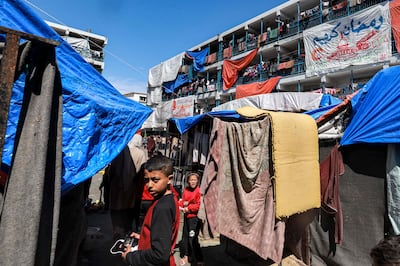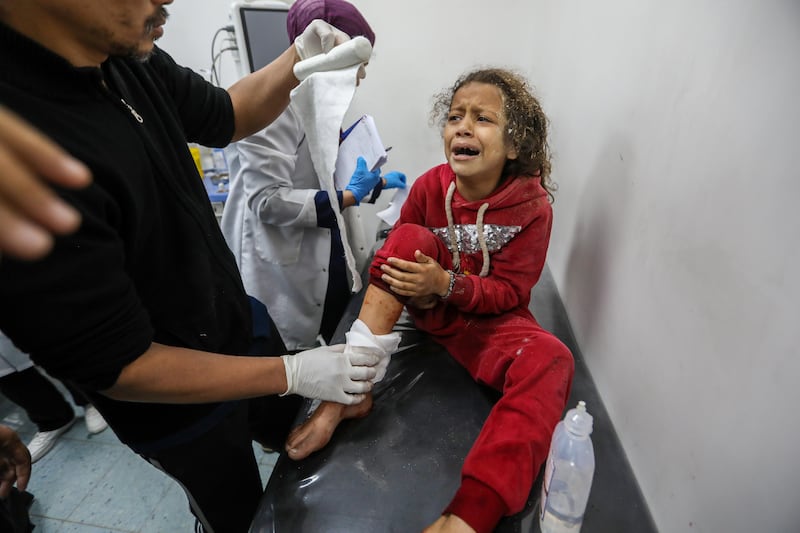Live updates: Follow the latest on Israel-Gaza
Doctors in Gaza faced with a drastic shortage of medical supplies have been forced to take desperate measures, including reusing materials from dead bodies, medics and aid officials who returned from a recent trip to the enclave said on Monday.
They painted a dire picture of the medical situation in Gaza, where there are no fully functioning hospitals after 200 days of war in the enclave.
The doctors explained how they had resorted to removing external fixators – stabilising frames that hold fractured bones together – from the dead and installing them on living patients.
“Doctors have now started to reuse some medical equipment meant for single use," Medical Aid for Palestinians chief executive Melanie Ward said.
"Doctors are now having to remove [external fixators] from patients who have died and reuse them on living patients. That’s how serious the situation is."
Vascular surgeon Dr Mahim Qureshi said she had to use a clean nappy to cover the wound of a man in Al Aqsa Hospital's emergency ward who had been wounded in his leg by Israeli shelling.
"That was the cleanest thing I could find in those minutes to place on his limbs," she said. The man later lost his leg.

With the absence of clean running water, surgeons are unable even to properly wash their hands between surgical procedures, she added.
Gaza's decimated infrastructure also means that raw sewage and human waste is left untreated and exposed to millions of people seeking refuge in overcrowded areas in Rafah.
"This has direct implications on children having to live in unhygienic and unsanitary conditions, with Israel not having switched on the water supply," said Ms Ward.
Dr Khaled Dawas, who recently visited Gaza, said "every single wound we have seen is infected".
With 40 per cent of aid convoys attempting to enter Gaza being returned, and almost all of the enclave's 2.1 million people on the brink of famine, the ramifications "are huge", causing a large segment of the population to become "immunocompromised".
More than 34,100 people have been killed and 77,000 wounded since October 7, Gaza's Health Ministry said, adding that thousands remain under rubble.
Last week, the International Rescue Committee (IRC) said even if a ceasefire were to come into effect immediately in Gaza, about 12,000 people would die as a result of disease in the next six months and 90,000 others would be killed as a result of "secondary impacts" if the conflict escalated further.

Massive displacement is compounding the problem of Palestinians being unable to have access to medicine and what little remains of the healthcare system.
A staggering number – perhaps 70 per cent of the population – are without adequate shelter, with about six in 10 homes either damaged or destroyed.
Many are afraid of returning to their neighbourhoods given the precarious situation.
The UN said this month that "up to 1.9 million internally displaced people were either residing in 154 UNRWA shelters or near these shelters".
"Due to the continued escalation of fighting and evacuation orders, some households have moved away from the shelters where they were initially registered," it said.

IRC vice president of emergencies Bob Kitchen has worked in the humanitarian sector for 25 years across various conflicts.
"I have never seen another example where two million people are cornered, slaughtered and starved and the world is essentially inert," he said.
Gaza's few functioning hospitals have reported siege-like conditions, with the UN saying that Israeli forces had hampered efforts to "deliver medical supplies, fuel, deploy emergency medical teams and facilitate the referral of critical patients".
Israel says its targets are Hamas fighters in hospitals, a charge health workers and the group deny.
Aid agencies warned the looming Israeli offensive in the southern city of Rafah would be disastrous for civilians.
There would be "no way possible" of Israel carrying out its operation without "human slaughter", Ms Ward said.
"There is no space to move. It would be impossible for them to attack and for it to not be a disaster of epic proportions."






